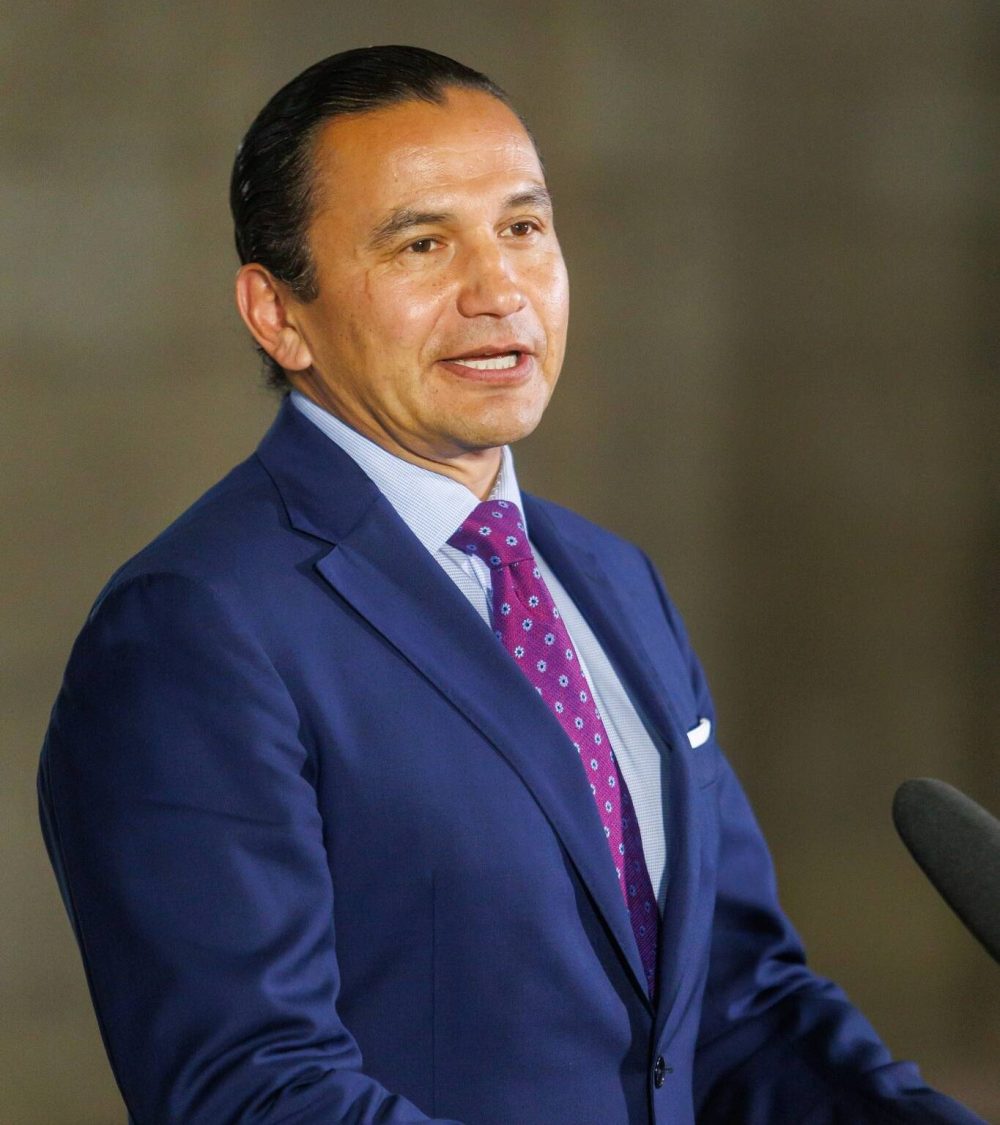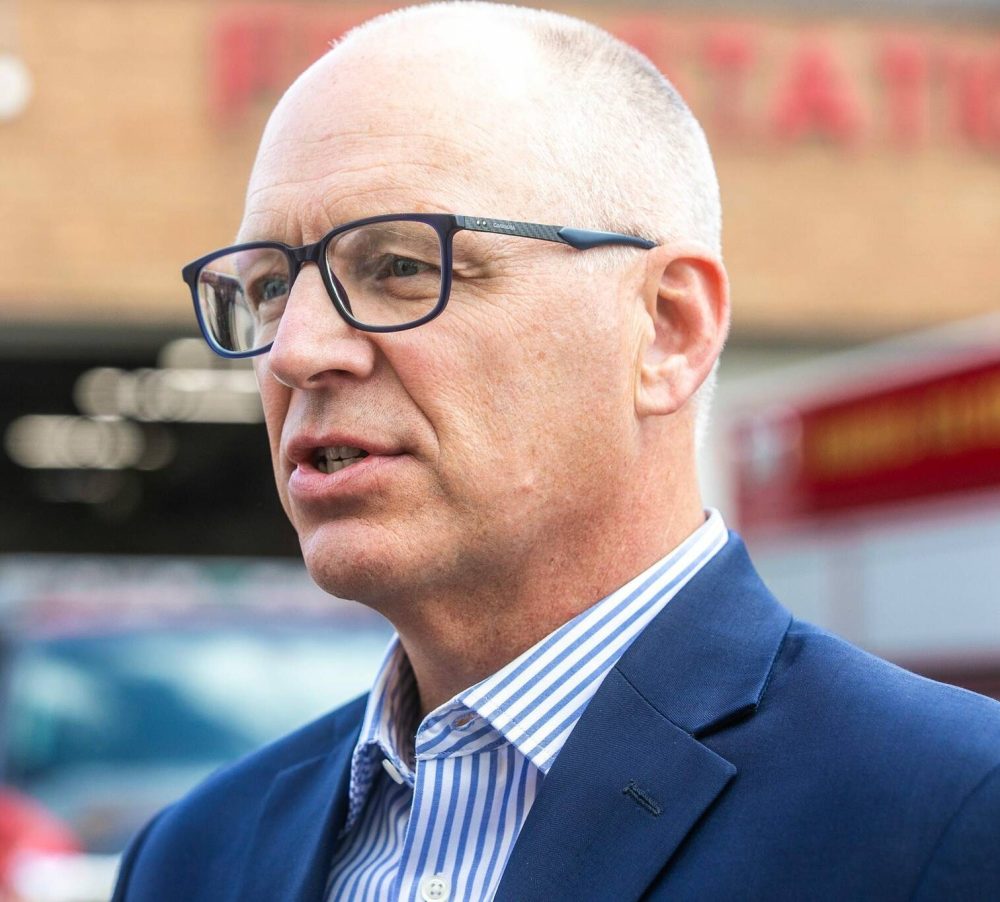Kinew, Gillingham hope to get their hands on some of Ottawa’s promised $51B in infrastructure funds
Advertisement
Read this article for free:
or
Already have an account? Log in here »
To continue reading, please subscribe:
Monthly Digital Subscription
$0 for the first 4 weeks*
- Enjoy unlimited reading on winnipegfreepress.com
- Read the E-Edition, our digital replica newspaper
- Access News Break, our award-winning app
- Play interactive puzzles
*No charge for 4 weeks then price increases to the regular rate of $19.00 plus GST every four weeks. Offer available to new and qualified returning subscribers only. Cancel any time.
Monthly Digital Subscription
$4.75/week*
- Enjoy unlimited reading on winnipegfreepress.com
- Read the E-Edition, our digital replica newspaper
- Access News Break, our award-winning app
- Play interactive puzzles
*Billed as $19 plus GST every four weeks. Cancel any time.
To continue reading, please subscribe:
Add Free Press access to your Brandon Sun subscription for only an additional
$1 for the first 4 weeks*
*Your next subscription payment will increase by $1.00 and you will be charged $16.99 plus GST for four weeks. After four weeks, your payment will increase to $23.99 plus GST every four weeks.
Read unlimited articles for free today:
or
Already have an account? Log in here »
As Prime Minister Mark Carney’s Liberal government puts its dollars behind infrastructure spending in its first budget, Manitoba’s elected officials are eyeing the pie.
Premier Wab Kinew said he’s seeking details on the promised $51 billion, particularly for agriculture-sector investments.
“It’s been a tough time with the canola tariffs, the pork tariffs and all the uncertainty with the Trump administration,” Kinew said Tuesday after Finance Minister François-Philippe Champagne tabled the long-anticipated budget in the House of Commons.
MIKE DEAL / FREE PRESS FILES Manitoba Premier Wab Kinew: “Shovel-ready projects.”
Kinew pointed to the Prairie Innovation Centre for Sustainable Agriculture in Brandon and the Global Agriculture Technology Exchange in downtown Winnipeg as “shovel-ready projects.”
The Port of Churchill was mentioned often in the 2025 budget, Kinew noted. It’s “another sign of momentum that we’re going to build this big nation-building project.”
“To put a finer point on it, there’s an icebreaker on the cover of their budget documents,” Kinew said. “Come on — send one of those over here to Manitoba.”
Mayor Scott Gillingham said some of the infrastructure funds would be welcome to cover the ballooning cost of upgrades at the North End sewage treatment plant, now estimated to be about $3 billion.
“This is an opportunity to get the federal funding for the third phase, which would be really critical to keeping water and sewer rates affordable for Winnipeggers,” Gillingham said. “That’s vital.”
Gillingham said he met with Federal Housing Minister Gregor Robertson two weeks ago, asking for treatment-plant funding, and money to expand Route 90 and the Chief Peguis Trail.
Funnelling some of the $51 billion to water treatment projects in other Manitoba communities — such as Portage la Prairie — would help enable home building, said Lanny McInnes, president of the Manitoba Home Builders’ Association.
“To put a finer point on it, there’s an icebreaker on the cover of their budget documents.”
Ottawa touts the new Build Canada Homes agency in its budget, saying it will help double the pace of home building over the next decade. However, much of the work will likely focus on rental units, McInnes said.
“This does not really address the market housing piece of the housing continuum (in Manitoba),” he said, adding the needs of both renters and potential homeowners have to be met.
The budget doesn’t address the need for a “robust investment” in non-market housing for low-income households, said Shauna Therese MacKinnon, a member of the Right to Housing Coalition.
Manitoba needs 11,189 new housing starts annually through 2035 to improve affordability, according to a Canada Mortgage and Housing Corp. report released earlier this year.
MIKAELA MACKENZIE / FREE PRESS FILES Winnipeg Mayor Scott Gillingham: “This is an opportunity to get the federal funding.”
Immigration cuts outlined in Tuesday’s budget could affect Manitoba home building in the long-term, McInnes said. Temporary resident admissions will be slashed from 673,650 in 2025 to 385,000 in 2026.
Meantime, civil service staff reductions will impact all front-line services for Manitobans, said Marianne Hladun, the Public Service Alliance of Canada’s regional executive vice-president for the Prairies.
The budget proposes cuts amounting to about 16,000 jobs by next year and 40,000 by 2028-29 to create a “sustainable” workforce.
“This will mean longer lines, delays in accessing services, all those people who have been waiting for years for immigration papers, all of those things will be impacted,” Hladun said.
The union represents between 9,000 and 10,000 front-line workers at Veterans Affairs and Service Canada, among other federal departments.
Hladun worries the government’s early retirement incentive to reduce employment numbers through voluntary departure will remove institutional knowledge from offices. Term employees, too, should be worried about the future, the union boss said.
Environment and Climate Change Canada is among the government branches asked to find savings. It has a 15 per cent savings target over three years.
“This is an opportunity to get the federal funding for the (North End sewage treatment plant’s) third phase, which would be really critical to keeping water and sewer rates affordable for Winnipeggers.”
Winnipeg-based Canada Water Agency is being scaled back — just two years after being established. ECCC shrinks as support for Canadian oil and gas production remains strong, said James Wilt, Climate Action Team Manitoba’s policy development manager.
“We see that as totally inconsistent with the need to rapidly wind down fossil fuel production and consumption,” he said.
“Huge concern for us when it comes to the prospect of shipping liquefied natural gas or any sort of fossil fuels through Manitoba.”
Kinew has floated the idea of shipping LNG through the Port of Churchill.
Wilt applauded a $40-million commitment to the Youth Climate Corps, a paid training program beginning next year.
Ottawa’s release marks a clear shift to an economic-based budget, said Bram Strain, president of the Business Council of Manitoba.
“We can do nothing and face certain calamity, or we can bite the bullet and invest in our economy’s diversification.”
He applauded the productivity super-deduction, a tax incentive aimed at returning investment costs to companies faster. Manitoba manufacturers will benefit, Strain said.
“(It) really changes the tax landscape here,” he said. “It will unleash capital. If anyone was holding off making investments on their production lines or increasing productivity, this will allow them to do more.”
The budget’s military spending — $81 billion over five years — will be a boon to Winnipeg and Shilo, Strain predicted.
The Port of Churchill will also boost Manitoba’s economy if it’s fast-tracked through Ottawa’s major projects office, noted Chris Lorenc, the Manitoba Heavy Construction Association’s president.
“We can do nothing and face certain calamity, or we can bite the bullet and invest in our economy’s diversification,” Lorenc said, adding he’d like to know which projects are eligible for the $51 billion in infrastructure funds.
Chris Avery, president of Arctic Gateway Group, said Port of Churchill budget mentions were a “significant commitment,” but there was no solid indication “per se” of an announcement date, if one materializes.
He’ll be looking into various funds cited in the budget, such as the Arctic Infrastructure Fund, he said.
The budget proposes to let Canada Post set its own postage rates, which Canadian Union of Postal Workers Winnipeg Local 856 president Sean Tugby supports.
“Anything to help us be more revenue-neutral, (is) generally, a good thing for us,” Tugby said.
In January, Canada Post raised its stamp price by 25 per cent, which could mean hundreds of millions of dollars in earnings for the floundering service, he said.
The Crown corporation reported an $841 million loss before tax for the 2024 fiscal year.
— With files from Carol Sanders and Joyanne Pursaga
gabrielle.piche@winnipegfreepress.com
nicole.buffie@winnipegfreepress.com

Gabby is a big fan of people, writing and learning. She joined the Free Press business beat in 2021.
Our newsroom depends on a growing audience of readers to power our journalism. If you are not a paid reader, please consider becoming a subscriber.
Our newsroom depends on its audience of readers to power our journalism. Thank you for your support.









